Parrott & Horsfield
Dyers Close (off Ingersley Vale), previously known as Higher Mills, was once the site of Bollington’s biggest brewery, operated firstly by Parrott & Horsfield, licensed brewers, from about 1874. John Horsfield, licensee of the Park Tavern in Macclesfield (owned today by Bollington Brewing Co.!) – see glass door panel below right – joined Thomas Parrott in partnership to establish the firm of Parrott & Horsfield.[1]
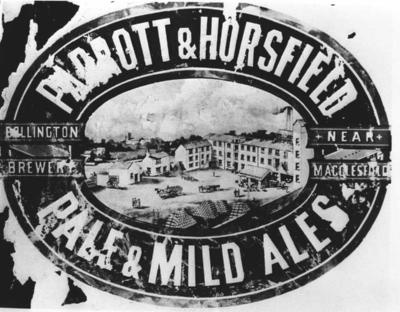 Horsfield retired from the business in 1891 due to ill health; he died in 1893 at the age of 62 and is buried in Bollington. Parrott continued to run the business alone but was declared bankrupt in 1893 with assets of £6,367 11s 3d and liabilities of £10,649 2s 1d.
Horsfield retired from the business in 1891 due to ill health; he died in 1893 at the age of 62 and is buried in Bollington. Parrott continued to run the business alone but was declared bankrupt in 1893 with assets of £6,367 11s 3d and liabilities of £10,649 2s 1d.
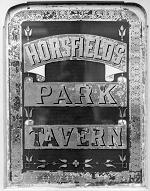 The picture (left) appears to be of an enamel advertising sign. The picture of the brewery is slightly stylised, for instance it doesn’t show the hills up the valley.
The picture (left) appears to be of an enamel advertising sign. The picture of the brewery is slightly stylised, for instance it doesn’t show the hills up the valley.
John Horsfield was one of the longest serving licensees in Macclesfield. He had seven sons and one daughter, Sarah Jane. She was tragically killed when her trap overturned on Chestergate in Macclesfield on 16th February 1892. She was just 27 years old.
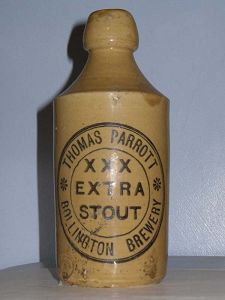 John outlived his wife and five of his sons. His eldest son Walter took over the pub and continued to run it until 1902. Another son, Arthur, had emigrated to Australia some years before John’s death. He ran the Kent Brewery
John outlived his wife and five of his sons. His eldest son Walter took over the pub and continued to run it until 1902. Another son, Arthur, had emigrated to Australia some years before John’s death. He ran the Kent Brewery![]() in Sydney. In the latter 19thC this brewery brewed an ale called Dinner Ale. Today Dinner Ale is brewed by the Bollington Brewing Co. and is available at the Vale Inn. Lee Wainwright, the proprietor of both the Vale and Bollington Brewery, has also, coincidentally, taken over the same Park Tavern to provide an outlet for his beers. What goes around comes around – even if it did take a century and a half! Bollington Brewing Co. moved from Adlington Road brewery to larger premises at Bond mill in Macclesfield April/May 2024.
in Sydney. In the latter 19thC this brewery brewed an ale called Dinner Ale. Today Dinner Ale is brewed by the Bollington Brewing Co. and is available at the Vale Inn. Lee Wainwright, the proprietor of both the Vale and Bollington Brewery, has also, coincidentally, taken over the same Park Tavern to provide an outlet for his beers. What goes around comes around – even if it did take a century and a half! Bollington Brewing Co. moved from Adlington Road brewery to larger premises at Bond mill in Macclesfield April/May 2024.
Many thanks to Frank Pegg for the picture of the Thomas Parrott stone beer bottle.
Document
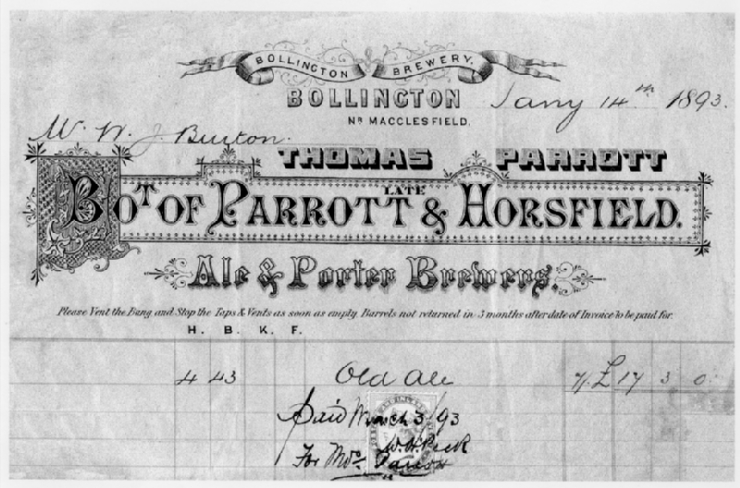
The billhead (above) was originally printed for Parrott & Horsfield. However, as Horsfield had left the business by 1891, Parrott had his stationery overprinted with ‘Thomas Parrott’ and ‘Late’ to avoid the cost of having a new set printed.
The products were sold in standard sized containers under the headings H B K and F – Hogshead (3 Kilderkins), Barrel (2 Kilderkins), Kilderkin (2 Firkins), Firkin (9 gallons).
The picture below, very kindly supplied by Paul Wreglesworth, shows two Parrott stone bottles and a similar Heaver Brothers bottle, all in first class condition (the bottles not the beer!). Many brewers made Extra Stout and many bottles such as these survive. However, the Stone Ale bottle is a rarity. Heavers are described in the next section below.
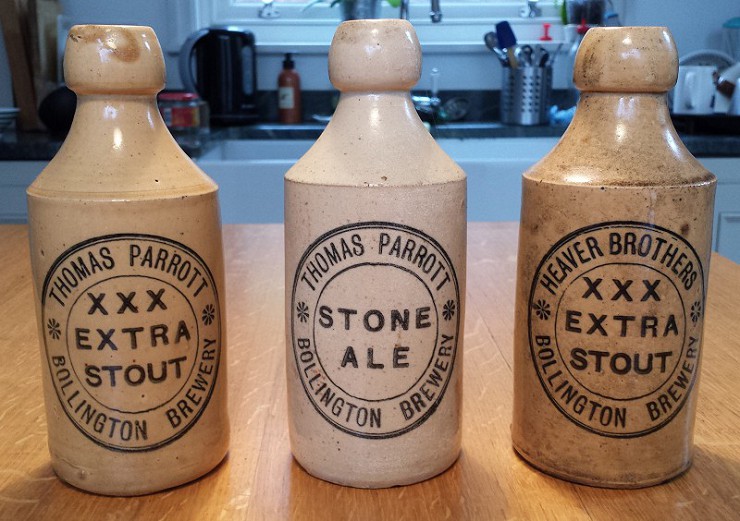
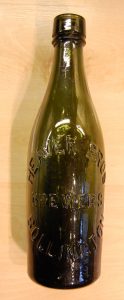 Heaver Brothers Brewery, Bollington
Heaver Brothers Brewery, Bollington
The Higher Mills brewery was acquired by Heaver Brothers in 1893, or very shortly afterwards, who operated from the Bollington site until the 1930s. In 1920 it became a bottling plant for Ind Coope products, the Burton-on-Trent brewer. It was lost in a disastrous fire on 3rd March 1931 when 36,000 bottles were destroyed.[2] The fine example of a bottle (right – click it for a bigger image) is possibly as early as 1910 and has the impression Heaver Bros Brewers Bollington. We also have another of these bottles but with the word ‘Limited’ added in the space below ‘Heaver Bros’. See also the Heaver Brothers stone bottle in the picture above which carried XXX Extra Stout. It is interesting to note that this product is not included in the price list shown below.
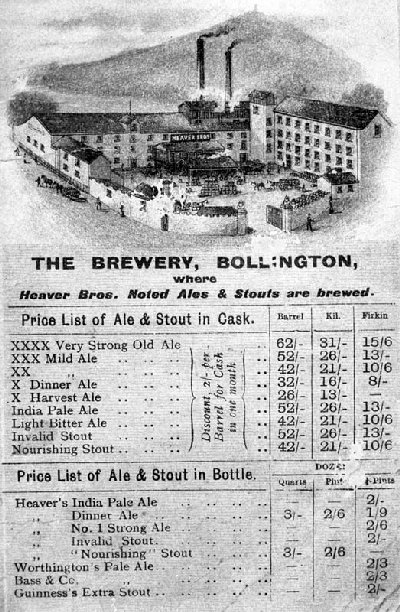 |
There were two mills on the site known as Higher Mills – the brewery occupied the newer of the two, in the centre and left in the artist’s drawing, left. The whole site later became Shrigley Dyers dyeing and bleaching works (slogan ‘We live to dye‘) before succumbing to housing development in 2001, Dyers Close today. George Heaver would appear to have been the driving force behind the brewery but at the time of the sale of the business to Samuel Allsopp & Sons In earlier days George Heaver lived at the house called ‘Jevington’ in Grimshaw Lane, which later became a retirement/care home, and was then demolished in 2016 to be replaced by three pairs of semi-detached houses. From 1896 he was a member of Bollington Urban District Council. The Chief Brewer was at one time Mr Oldfield. |
|
Paul Wreglesworth writes that “one imponderable seems to be when Heaver Brothers actually ceased brewing at the Bollington Brewery. They sold most of their pubs in 1920, perhaps as a consequence of the post war depression. Contemporary references to the fire of 1931 make reference to a bottling company and the destruction of many bottles but do not mention any brewing plant. Similarly the eventual sale in 1933 refers to Heaver Brothers as beer dealers and the sale particulars only refer to bottling equipment on the brewery site. Brewing probably ceased sometime before 1931 but I have been unable to pin the date down further.” The picture (above) shows a price list from Heaver Bros brewery but it is undated. The pictures are from the collection of thousands available to be seen at the Discovery Centre , Clarence Mill. Heavers supplied beer to the Turners Arms, the Cock & Pheasant, the Britannia, the Grapes and the Flying Horse among others. |
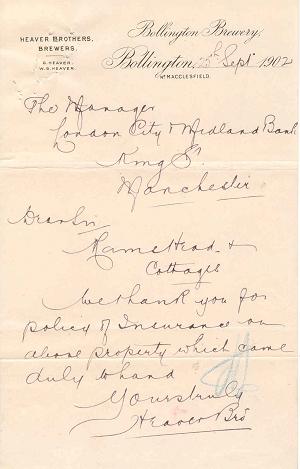 |
In operation, 1914
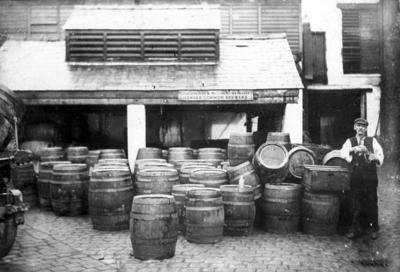 |
In 1914 it was mainly beer in barrels which would have been distributed to local pubs by horse and dray. |
Disastrous fire
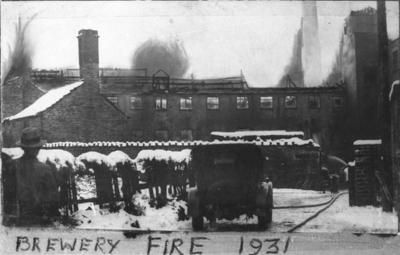 |
The 1931 fire completely destroyed the mill, and the bottling business never restarted in Bollington. Notice the fake flames! These were added to the picture presumably by the photographer (we have three different copies). He should have used Photoshop or AI then we might never have noticed! |
George H Gill
Greenwood & Gill
Pimlott & Co
Pimlott & Gatenby
|
The Discovery Centre has in its collection bottles with the names and the word Bollington moulded into them for the first three (picture right). Paul Wreglesworth believes that they may be mineral water or soft drink bottlers rather than brewers. He has discovered that in Kelly’s 1890 Cheshire directory there is a ‘mineral water manufacturer‘ listed in Queen Street, Bollington. At that time they traded under the name of Pimlott & Gatenby. Both Thomas Pimlott and Thomas Gatenby are listed separately (as mineral water manufacturers) in Defiance Street (later known as Defiance Brow, now part of Queen Street). Thomas Pimlott is also listed as a ‘wood turner‘. See Defiance mill. A bobbin mill was located next to Defiance mill; They do not appear in the 1887/88 directory so the business was probably established toward the end of the 1890s. |
 |
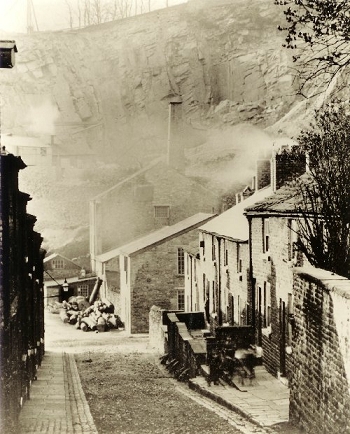 |
By 1910 the concern is listed simply as ‘Pimlott & Co, mineral water manufacturer, Queen Street‘. Gatenby had died in 1907. By 1914 (Kelly’s 1914 Cheshire directory) we still have a Pimlott & Co listed at Queen Street as ‘mineral water & bobbin mnfrs‘ perhaps drawing on his wood turning skills that were listed back in 1890. The picture (left) shows the bobbin mill with logs piled outside at the bottom of Defiance Brow* in about 1905. Kelly’s 1939 directory lists ‘Pimlott T & Son., firewood dlrs., Queen st.‘ so Pimlott was still around but had diversified once more. Considering the span of time from 1880 to 1939 it is possible that there was more than one generation trading under the Pimlott name during this time. We have also found a bottle moulded with the name ‘T. Stonier Late Pimlott & Co Bollington’. This suggests that Pimlott sold his bottling business at some stage to concentrate on his other interests. Further research required. |
|
* The mills at the bottom of the hill are often listed as being in Queen Street. It isn’t clear where Queen Street ended and Defiance Brow began. I suspect the connection might have been this side (see picture) of the two mills which was effectively a cross road, to the left into Pool Bank, to the right into Oak Bank mill, and I believe the latter road originally went right through the mill to the Shrigley Road / Ingersley Road junction (the roundabout today). The brow was previously known as Defiance Street. |
|
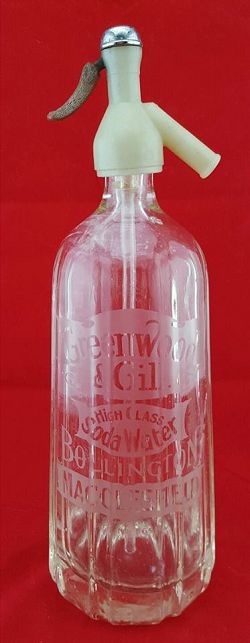 |
George H Gill were advertising bottled waters and non-alcoholic drinks in 1928 and giving their address as Queen Street. It looks as though mineral water manufacturing was going on somewhere in Queen Street for around 25-30 years from the late 1890s to after the first world war. The Pimlott bottle shown above would date from the later period. The Greenwood & Gill soda siphon shown in the picture (left) has been acquired from the USA by the Discovery Centre . It is probable that Greenwood & Gill were based in Queen Street in the early 20thC, this bottle dating from c.1920s. |
Brewing again in the 21st Century!
Bollington Brewing Co.
In July 2008 beer was once again being brewed in Bollington, this time by Lee Wainwright, the licensee of the Vale Inn, Adlington Road, operating under the name Bollington Brewing Company![]() . Lee had occasionally considered brewing then one day at a publican’s event in Suffolk he chanced to hear of a micro brewery that wished to dispose of its brewing equipment. A deal was done and the plant duly moved to Bollington.
. Lee had occasionally considered brewing then one day at a publican’s event in Suffolk he chanced to hear of a micro brewery that wished to dispose of its brewing equipment. A deal was done and the plant duly moved to Bollington.
The first brew was tasted at the Vale Inn on Thursday 24th July 2008 with the first retail pint going to Rob Nicholson, a local CAMRA representative. The first brew was called just that – First Brew – and a very good pint it was to! Light in colour, slightly hoppy with an excellent flavour – my idea of the perfect pint. I only hope Lee can produce the same again, and again, and again! He does, today it’s called Bollington Best! Their most popular pint today is called Long Hop.
The second brew was a Porter – Bollington Nights is black with a fine head, very tasty. Several others have followed. They have since won numerous brewing awards. Call in and try a couple or three. See the brewery web site![]() .
.
In February 2024 Bollington Brewing moved to larger premises in Brook Mill, Parker Street, Macclesfield, where they also provide a brewery tap. By the end of 2024 they have in addition to the tap expanded their estate to five pubs and bars: Vale Inn, Bollington, Park Tavern, Macclesfield, Cask Tavern, Poynton, The Fountain, Macclesfield, Foundry, Congleton.
Happy Valley Brewery
A new one in 2009, the Happy Valley Brewery![]() is already history, ceasing production in early 2018. This was very much a micro brewery, being located in a small unit in the heart of Bollington. However, David Hughes previously had 20 years experience creating the golden nectar so this was a good product from day one. The brews were regularly on the bar at the Poachers Inn, and very popular. Over the years David won many awards for his outstanding brews.
is already history, ceasing production in early 2018. This was very much a micro brewery, being located in a small unit in the heart of Bollington. However, David Hughes previously had 20 years experience creating the golden nectar so this was a good product from day one. The brews were regularly on the bar at the Poachers Inn, and very popular. Over the years David won many awards for his outstanding brews.
The brew kit and the recipes were sold to new owners, Junction Leisure Ltd., who are operating it from their public house, The Ox‑fford in Oxford Road, Macclesfield, since re-named ’73andPIZZA’. They also owned the now closed Crown Inn, in Church Street, Bollington.
References
Clicking the reference description below takes you back to the text above.
- Paul Wreglesworth, researcher and writer on Macclesfield & district pubs and brewers
- Some of the information on this page comes from Looking Back at Bollington, Longden & Spink, 1986 (Books)
Acknowledgements
I am most grateful to those who have provided additional information on the old pubs and breweries of Bollington, and particularly to Paul Wreglesworth. These pages have become a very interesting collection of pub and brewery heritage as a result.
I am very much indebted to Paul Wreglesworth, noted for his research and books on the Pubs & Breweries of Macclesfield, for providing corrections and further information about the brewery at Higher Mills, the Heaver family and on Parrott & Horsfield.
Please let me know of any other old pubs and breweries of Bollington or anything else you know about those already listed – please send me a message!
Your Historic Documents
Please don't chuck out those historic documents and pictures! Find out why here.